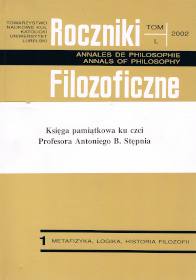Świadomość a problem redukcji
Abstrakt
The author discusses the question of reduction of consciousness. At the beginning she declares her externalistic and realistic position. Her externalism is seen through the nature of human action which demands both, intentionality and consciousness. But her argumentation against reduction of consciousness is made from an internalistic (not externalistic) point of view, and is supported by some results given by certain cognitive neuroscientists, like Susan Greenfield, for instance. In line with those neuroscientists she argues that consciousness (consisted in conscious states) is characterized by such features (like: spatial multiplicity, modality, single temporality) which in spite of their neuronal realizability, are not reducible. Another specific feature of consciousness (especially emphasized in philosophy by Kant and Husserl) is its ability to synthesize. In her consideration, the question of synthesis (contrary to Stanisław Judycki who used it in his argument against naturalistic conceptions of the mind) remains open.
To conclude, she defends a many-dimensional strategy of research and thinks that despite the continuity between the account of the mind and the natural world, there is a place for nonnaturalized epistemology in which our rich mental life can be also viewed in certain autonomy.
Bibliografia
Block N., Flanagan O., Güzeldere G. [eds.] (1998), The Nature od Consciousness, Cambridge Mass.: MIT Press.
Churchland P. (1989), A Neurocomputational Perspective. The Nature of Mind and the Structure of Science, Cambridge Mass.: MIT Press.
Dennett D. C. (1993), Consciousness Explained, London: Penguin Books.
Dennett D. C. (1998), Brainchildren. Essays on Designing Minds, London: Penguin Books.
Dennett D. C., Kinsbourne M. (1992), Escape from the Cartesian Theatre, „Behavioral and Brain Sciences”, 15, s. 183-200.
Eccles J. C., Popper K. (1977), The Self and its Brain. The Argument for Interaconctionism, Berlin: Springer (London−New York).
Edelman G. M. (1989), The Remembered Present. A Biological Theory of Consciousness, New York: Basic Books.
Edelman G. M. (1998), Przenikliwe powietrze, jasny ogień. O materii umysłu, Warszawa: PIW.
Flanagan O. (1992), Consciousness Reconsidered, Cambridge Mass.: MIT Press.
Greenfield S. (1997), How Might the Brain Generate Consciousness?, „Communication and Cognition”, 30, nr 3/4, s. 285-300.
Judycki S. (1990), Intersubiektywność i czas. Przyczynek do dyskusji nad późną fazą poglądów Edmunda Husserla, Lublin: RW KUL.
Judycki S. (1995), Umysł i synteza. Argument przeciwko naturalistycznym teoriom umysłu, Lublin: TN KUL.
Kinsbourne M. (1988), Integrated Field Theory of Consciousness, w: Consciousness in Contemporary Science, eds. A. Marcel, E. Bissiach, Oxford: Oxford University Press.
McGinn C. (1989), Can we Solve the Mind-Body Problem, „Mind”, 43, repr. w: McGinn 1995.
McGinn C. (1995), The Problem of Consciousness, Oxford: Blackwell.
Millikan R. (1984), Language, Thought and Other Biological Categories, Cambridge Mass.: MIT Press.
Penrose R. (2000), Cienie umysłu, Warszawa: PIW.
Putnam H. (1988), Representation and Reality, Cambridge Mass.: MIT Press.
SearleJ. R. (1999), Umysł na nowo odkryty, Warszawa: PIW.
Copyright (c) 2002 Roczniki Filozoficzne

Utwór dostępny jest na licencji Creative Commons Uznanie autorstwa – Użycie niekomercyjne – Bez utworów zależnych 4.0 Międzynarodowe.





